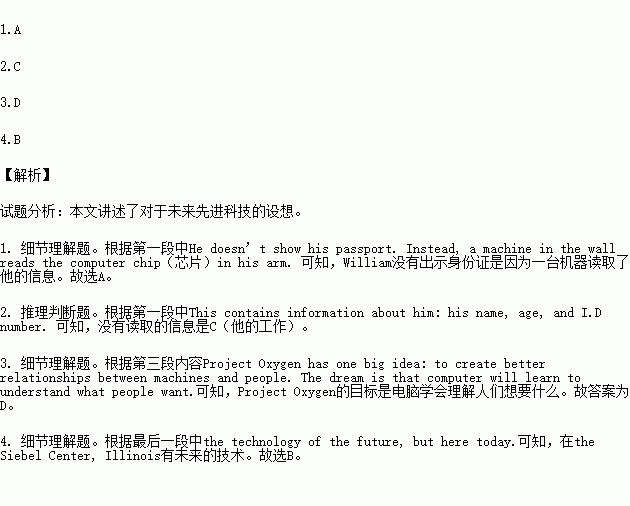题目内容
The Future of Technology
William, a businessman, arrives in a foreign airport. He doesn’t show his passport. Instead, a machine in the wall reads the computer chip(芯片)in his arm. This contains information about him: his name, age, and I.D number. He exits the airport, and a car door opens when it “sees” him. The car takes him to his hotel. His room “knows” he has entered the building and it “reads” his body. He is cold, so the room becomes warmer. William then watches a business presentation on a video wall. When he takes a bath, the presentation “follows him and continues ”on the bathroom wall. Finally, the room plays music to help him sleep. It turns off the music when it “sees” him sleeping.
William doesn’t exist, and none of this is real. But it might be soon. “In five to ten years, computing and communications are going to be free and everywhere, in your walls, in your car, on your body,” says Victor Zue, leader of Project Oxygen.
Project Oxygen has one big idea: to create better relationships between machines and people. The dream is that computer will learn to understand what people want.
So, what changes will there be at work? Firstly, the building will know where everyone is, all the time. You want to talk to someone? Type the person’s name on the nearest computer. It will show you a map of the building and exactly where this person is. You then call this person, who picks up the nearest telephone, also shown on the computer. If he or she is busy with a client(客户)or in a meeting, the computer will tell you.
Is all this really possible? Visit the Siebel Center, Illinois and see for yourself: computers in the doors and walls, cameras everywhere, the technology of the future, but here today.
1.William doesn’t show his passport because ________.
A. his information can be read by a machine
B. he doesn’t need a passport in that airport
C. he is not required to show his passport
D. only a man from foreign country needs to show his passport
2.The computer chip in William’s arm contains his information except ________.
A. his name B. his age
C. his job D. his I.D. number
3.The dream of Project Oxygen is that computers will ________.
A. show you where the person is you are calling
B. let you pick up the nearest telephone
C. show you a map of every building
D. learn to understand what people want
4.In the Siebel Center, Illinois, ________.
A. computers are everywhere
B. the technology of the future is there today
C. there are cameras in the doors and walls
D. the future technology will be there in 5-10 years

